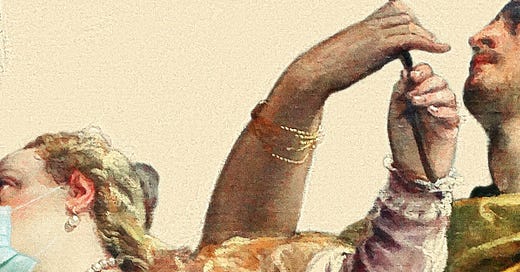Amnesty and Mercy
On Prof. Emily Oster’s article on amnesty for those who were “wrong” during the COVID crisis.
First, I should note that Prof. Oster was courageous in advocating for schools to open, and paid a heavy price for doing so, heavier than I did, and I am grateful for her work to turn back what was likely the most harmful COVID mistake.
Even though their dictionary definitions are nearly identical, the Catholic in me prefers the term “mercy” to “amnesty.” Yes, both imply that we are reducing or eliminating a deserved punishment, but “mercy” makes it clearer that a transgression has occurred, punishment is merited, and we are asking those injured to forgo this punishment. “Amnesty” sounds more like an entitlement. Amnesty International doesn’t operate from the assumption that political prisoners had it coming, and is asking despotic regimes to forego punishment; it is assuming that they are wrongly imprisoned, and justice demands their release.
And as far as mercy goes, I’m a fan. It’s part of why I categorically oppose capital punishment. I’m counting on mercy for my own salvation. It is healthier for us to let go of anger and seek opportunities to heal than to hold on to anger. Sing along.
With that slight re-frame in mind, let’s dive in.
I think it’s helpful to break down the mistakes and errors on a continuum:
Taking a precaution that only impacts you (foregoing crowded events, masking yourself, only shopping off-hours, etc.) (1)
Taking a precaution that impacts other people (foregoing a visit to others, restricting activities of family members, insisting those visiting your home follow precautions)
Chastising and exerting social pressure on those not engaging in precautions.
As a layperson, advocating precautionary restrictions and mandates.
As an expert, advocating for precautionary restrictions and mandates.
Implementing restrictive precautionary measures.
Suppressing information that could have led to fewer precautionary restrictions and mandates.
I think it’s also useful to consider how knowledge evolved, and who should have been in a position to know it. Knowledge about how the virus spread, how virulent it was, how it impacted different populations, and how effective the vaccines were in preventing transmission.
Prof. Oster plays a a bit of a motte-and-bailey game by beginning with the story of her masked family hikes in the spring of 2020. This was, at most, a Level 1-2 violation (I suppose her child reminding another hiker about social distancing could be considered a Level 3 action, but for a child culpability is reduced) at a time when our knowledge was limited.
Didn’t we all go a little crazy back then? Can’t we recognize that we are all capable of such errors? And can’t we extend grace to those who made similar mistakes? Particularly if we were acting on the advice of experts, and following the our leaders, who were in close consultation with them?
Sure. And this is the maximally charitable reading:


But the timing of the article coming out a week before Election Day suggests something else:
I strongly suspect we’re not just being asked to forgive our relatives who skipped a visit in 2020 because they didn’t feel safe flying, or the parents who cancelled playdates or insisted they’d be masked. But for officials who kept schools closed, governments and employers who fired employees over vaccines mandates, and those who heaped abuse on those who dared disagree (very much including Prof. Oster).
This won’t do. We should expect more from our leaders, and those who present themselves as experts. They’re supposed to keep a level head in a crisis, not be overcome with fear.
And if they’re insisting on restrictions based on the precautionary principle with little information, they need to actively seek out information to determine whether these precautions are effective, and that their benefits outweighs their costs.
And if they don’t do that, and don’t own up to their mistakes, and don’t identify how they’ll prevent it from happening again, then the shouldn’t be leaders or experts anymore.
We can still love them. We can still hope for the best for them. It’s not about vengeance. They have simply demonstrated they are not up for the job, and thus shouldn’t have it anymore.




